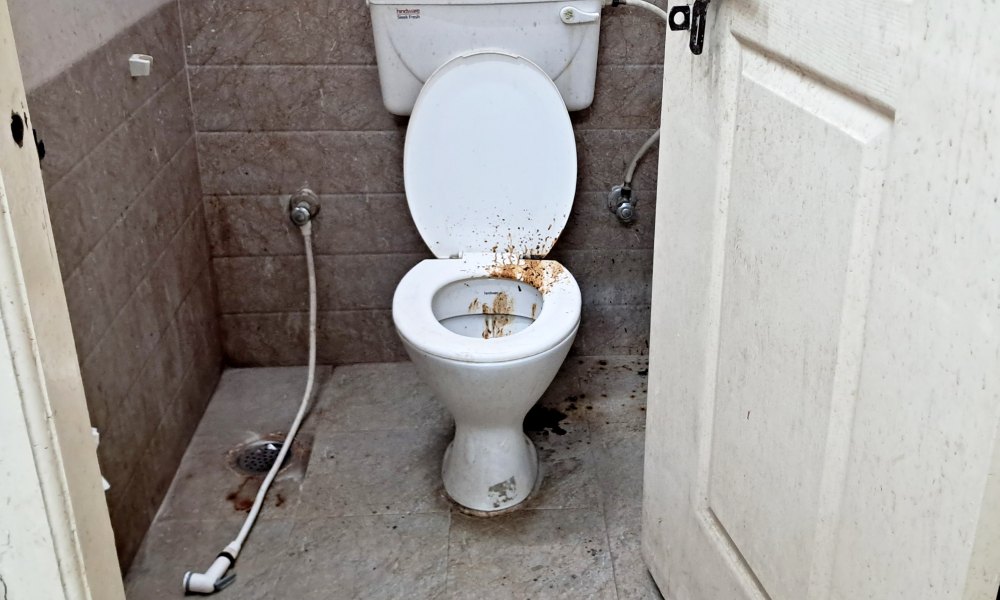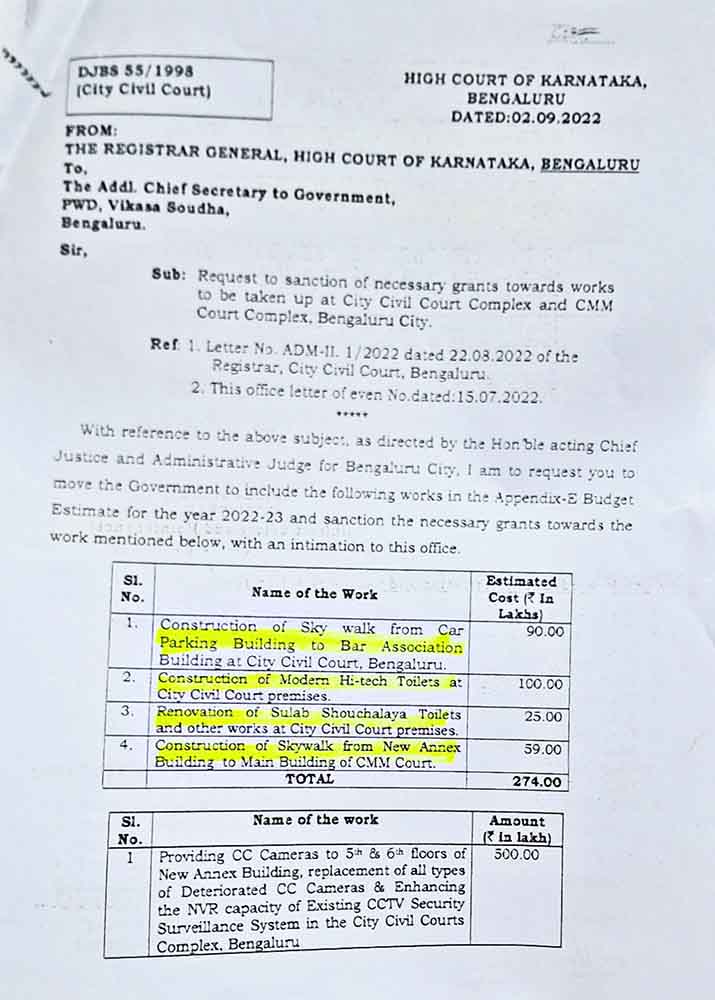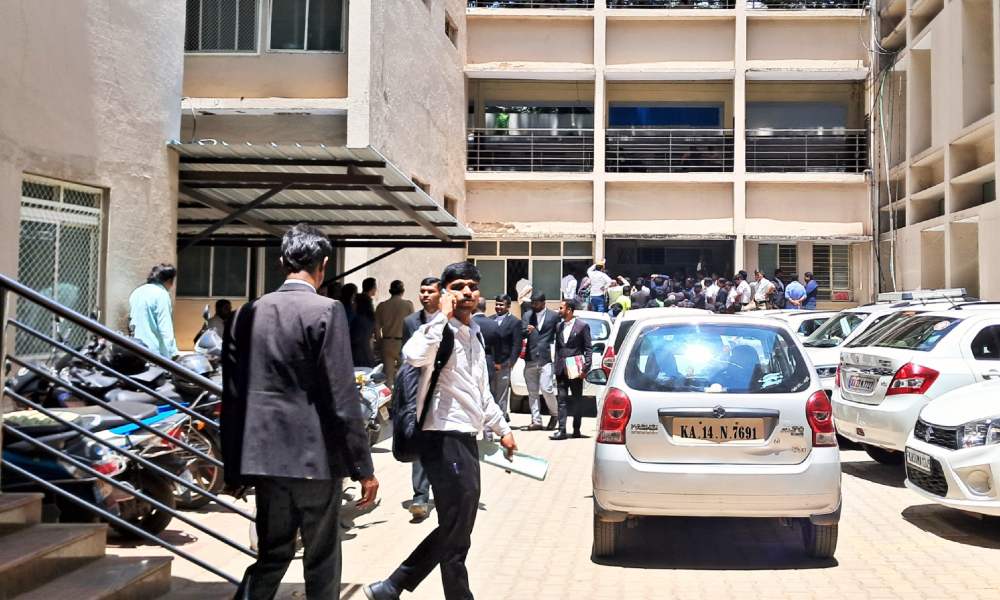Toilets in the city court premises are filthy. Women risk contracting infections, have to deal with fetid odor, and walk long distances in search of clean facilities.
Women visiting Bengaluru’s City Civil Court and Chief Metropolitan Magistrate Courts (CMM) said that these complexes lack clean and well-maintained restrooms, forcing them to walk long distances in search of usable facilities.
Several female lawyers said that they have contracted Urinary Tract Infections (UTIs). They also complained about unavailability of sanitary pads, foul restroom odors and long queues. Consequently, they said they have had to walk considerable distances within the court premises for clean facilities.

“I’ve been practicing here for 28 years, and whenever I’ve used the restrooms within the premises, I often had problems like UTIs and itching. That’s why we choose to use the pay-to-use toilets next to our building. They’re closer, and we believe they’re less likely to cause infections. Even though the washrooms here look clean because of the constant water supply, they’re not as sanitised as they should be,” said advocate Varija.
Advocates have raised ongoing concerns about restroom problems at the CMM and City Civil Court, highlighting the lack of sanitation improvements over the years.“Women’s concerns often go unaddressed. The lack of attendants at court complexes leads to poor restroom conditions as people use them without anyone to maintain cleanliness,” said senior advocate Vimala. Akanksha, a civil law practitioner at the CMM Court, highlights the poor state of restrooms. She said, “The washrooms are consistently unclean, leading us to limit our water intake and manage accordingly.” Both senior and junior advocates have repeatedly expressed their concerns to the Advocate’s Association, the lawyers said.

Mr. Vivek Subba Reddy, President of the Advocates Association of Bengaluru (AAB), spoke about the persistent issues of insufficient and poorly maintained public restrooms. He said, “We’ve put forth a proposal to the government for the establishment of modern high-technology restrooms, similar to those found in international airports.” Furthermore, Mr. Reddy noted that the High Court has appealed to the government to allocate an estimated Rs 1 crore, for essential renovations at the City Civil Court and CMM Court complex. This funding is intended for the construction of modern, high-tech restrooms at the City Civil Court premises. He said that once funds are approved, they will hire contractors and begin construction and renovation of the court restrooms.
In 2021, the (then) Chief Justice of India proposed the creation of the National Judicial Infrastructure Authority of India (NJIAI). A notable aspect of the proposal is that NJIAI will function as a central entity responsible for formulating the strategy to plan, establish, develop, upkeep, and oversee operational infrastructure for the Indian Court System, including similar setups within all High Courts.

Mr. Anand T. Chavan, the registrar of the City Civil Court, said that they have hired independent contractors responsible for maintaining cleanliness in restrooms within the court complex. He said, “Every two hours, we ensure they are cleaned.” Mr. Chavan also emphasized that when the court was initially being constructed, no one had anticipated the flow of people from all over India who come to practice there, resulting in a shortage of restroom facilities for advocates. Recognizing the impact on female advocates due to the neglect of their basic needs, Mr. Chavan said that they planned to install automatic sanitary pad machines.
Ranjith, a contractor from Sulabh International, supervises restroom maintenance at both the court premises. He stated that they employ a rigorous cleaning schedule, with attendants cleaning toilets three times daily and sweeping floors every two hours, and cleaning agents like acid and bleach are used to eliminate odor. Female attendants are hired to be present on the premises to monitor and maintain the cleanliness of the washrooms, he added. However, the court’s restrooms emit persistent foul odors and have waterlogged, unclean floors.
Experts said that public toilets in India, including those in courts, schools, railway stations, bus stands, and hotels, often face cleanliness issues. “This lack of attention to hygiene is a concerning aspect of public discipline in India, especially affecting women’s morbidity that arise due to unhygienic conditions, resulting in health problems. Swachh Bharat Abhiyan was started for the construction of toilets and raising awareness, but there’s still a long way to go. It’s a shared responsibility, not just the government’s,” Dr Ramesh Kanbargi said.
Despite implementing various measures, the standard of restroom facilitiescontinues to be subpar at the courts. Senior advocate Lakshmy Iyengar said, “It’s always been an uphill task for women to get the basic necessities, so the fight is always on. The sensitization has come in, which was lacking earlier, but there is still a long way ahead.”




